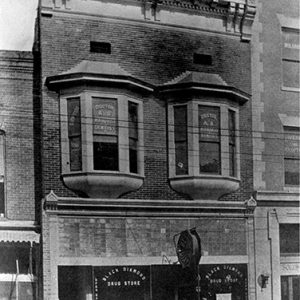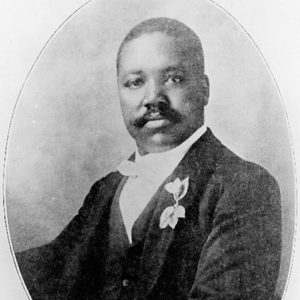calsfoundation@cals.org
Napoleon Bonaparte Houser (1869–1939)
Napoleon Bonaparte Houser was a prominent African American physician, owner of the Black Diamond Drug Store, and investor in Helena (Phillips County) from 1901 to 1920. He came to Helena from Charlotte, North Carolina, as the Arkansas Delta’s population and opportunities grew, but returned to the place of his birth following the Elaine Massacre.
N. B. Houser was born near Gastonia, in Gaston County, North Carolina, on February 14, 1869. He was the son of William H. Houser, a well-to-do brick mason and contractor, and Fannie Houser, a housekeeper and mother. The youngest of six siblings, Houser attended public schools in Charlotte and worked as a farm hand on his father’s farm until the age of fourteen, when he began to work at his father’s brick factory. At sixteen, he became his father’s personal secretary.
In 1881, Houser entered the Presbyterian-affiliated Biddle University in Charlotte. In 1887, after graduating from Biddle, he entered Leonard Medical School at Shaw University in Raleigh, North Carolina. After finishing medical school in 1891, he received his medical license from the North Carolina Medical Board and began his medical practice in Charlotte. From 1891 until 1901, he consulted with Biddle University, supervised Samaritan Hospital for three years, and served one year as president and two years as secretary of the North Carolina Colored Medical Association—an organization he helped found. Around 1890, he married his first wife, Maggie (maiden name unknown), a North Carolina native according to the 1900 Census.
Houser moved his medical practice from Charlotte to Helena in June 1901, following a visit to his brother, Charles, who was working there as a brick mason. According to a 1911 profile, Houser saw Helena’s “climate, fertile soil and teeming population of the race” as “a veritable Promised Land.” Helena, a booming Mississippi River town in the Arkansas Delta, was full of opportunities. It was at the center of a regional economy dominated by cotton and hardwood timber; it was also the seat of Phillips County, which, in 1900, had a mostly rural agricultural population that was over seventy-eight percent Black. Simultaneously, increased racial tension in North Carolina and Charlotte likely pushed Houser to pursue new opportunities outside his home state. In the spring of 1899, North Carolina passed a Jim Crow railroad bill that insulted the values of Black middle-class citizens like Houser, who believed that hard work, education, and ultimately, success, would earn respect and insulate their class from white racism. Then in 1900, as Democrats campaigned for a disfranchisement amendment, white supremacy clubs sprung up throughout the state. With the amendment’s overwhelming support, especially in Houser’s home county of Mecklenburg, Charlotte’s luster was lost in the eyes of a young and ambitious Houser.
Houser apparently moved to Helena without his first wife and soon married another North Carolina native, Annie S. Alston, on January 18, 1902, in Helena. They had one daughter, Willie Henry Houser, who was born around 1914. Houser prospered as one of the few Black doctors in Helena. In either 1904 or 1908, depending upon the source, he opened Black Diamond Drug Store in downtown Helena with $7,500 in capital. According to the 1909 Helena City Directory, the drug store operated at 301½ Cherry Street, with Drs. N. B. Houser and S. H. Hargroves attending. Later, the drug store had addresses at 308½ Cherry Street (1911) and 316 York Street (1917). In 1911, Houser reported that the drug store did $2,000 in sales each month.
In 1910, Houser became president of the Helena Negro Business League. He invested considerably in rental property and purchased stock in the Phillips County Land Investment Company and the Mound Bayou Oil Mill Manufacturing Company. Houser was also active in the social life of fraternal organizations, including the Prince Hall Masons, the Knights of Pythias, and the Mosaic Templars of America.
In 1920, soon after the October 1919 Elaine Massacre, Houser left Helena and resumed his medical practice in Charlotte. Upon his death on August 28, 1939, the Charlotte Observer described his medical practice as “one of the largest practices of any negro doctor in the Carolinas.” He is buried in Charlotte’s Pinewood Cemetery.
For additional information:
Greenwood, Janette Thomas. Bittersweet Legacy: The Black and White “Better Classes” in Charlotte, 1850–1910. Chapel Hill: University of North Carolina Press, 1994.
Hamilton, G. P. Beacon Lights of the Race. Memphis: P. H. Clarke and Brother, 1911.
Richardson, Clement. The National Cyclopedia of the Colored Race. Montgomery, AL: National Publishing Co., 1919.
Smith, C. Calvin. “Serving the Poorest of the Poor: Black Medical Practitioners in the Arkansas Delta, 1880–1960.” Arkansas Historical Quarterly 57 (Autumn 1998): 287–308
Strong, Charles Moore. History of Mecklenburg County Medicine. Charlotte, NC: News Printing House, 1929.
Obituary of N. B. Houser. Charlotte Observer. August 29, 1939, p. 6.
Blake Wintory
Little Rock, Arkansas
 Early Twentieth Century, 1901 through 1940
Early Twentieth Century, 1901 through 1940 Health and Medicine
Health and Medicine Black Diamond Drug Company
Black Diamond Drug Company  N. B. Houser
N. B. Houser 




Napoleon Bonaparte Houser was my great-grandfather. To see his legacy and life recorded in the Encyclopedia of Arkansas is humbling and a honor. Although my family and I discuss his life and work continually, I am grateful and thankful to know that the world knows that Napoleon Bonaparte Houser was here. Sleep in peace, Grandpa; we love you!